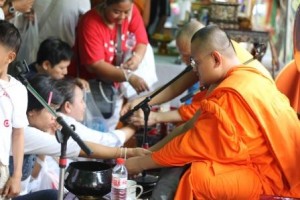I have been in Thailand since the beginning of January conducting research into the political identity and attitudes of the Buddhist monks of the country. My research is organized around the problem of how monks and novices see themselves as citizens, and whether being a monk interferes with or works together with their citizenship. Buddhism is a central part of Thai national identity, with some 90% of the population presumed to be Buddhist, and ordination as a monk for at least several weeks is widely understood as being an important responsibility that Thai men should undertake (though many do not). Moreover, while Buddhism has not been established as the official religion of the country, the king is required to be Buddhist and “religion” (often though not always understood to be Buddhism) is one of the three central “institutions” of modern Thailand, along with the king and the nation (ie the people). Buddhism is thus central to “thai-ness,” and formally at least monks have a very high status in Thai society.
Yet this doesn’t always translate into the lives of individual monks, and it is the attitudes of individual monks into their status that I have been trying to understand. For example, while Thailand is a democracy (coup’s aside), and women were enfranchised several decades before they were in the United States, monks are forbidden from voting in elections. The rationale for this is that monks are in the center and above politics. If they have the right to vote, the argument goes, this will foster division within society, and that is seen as contrary to their primary role in Thai society. Many monks that I have talked to this spring do not seem to be particularly troubled by their disenfranchisement. Some have said to me, for example, that if they could vote, they were afraid that they would be the subject of lobbying by politicians, something they had no interest in. For the first month or so that I was asking monks about this, all of them told me about being “in the center,” and I thought that monks simply did not want to vote. Then one day, by chance, I asked a monk, “So, you don’t want to vote?” He looked at me as if I was silly. “I didn’t say that, I would be happy to vote if I could.” Since then, I have followed up my question about monks voting with questions about the individual monk voting. A somewhat different picture has emerged as a result. While none of the monks seems to want to take to the streets to push for enfranchisement, some 2/3 of them have told me they would like to vote if they could.
I am still in the process of coming to understand the implications of this. Most monks in Thailand are Thai citizens; being a monk changes what they the can do as citizens. It provides them with access to educational opportunities but changes how they can participate in the political process. But it is unclear to me whether most monks think that they should have a voice in society – as monks.
In a few days, I will post some thoughts about the coup last week and the political protests of the last year that precipitated it.

